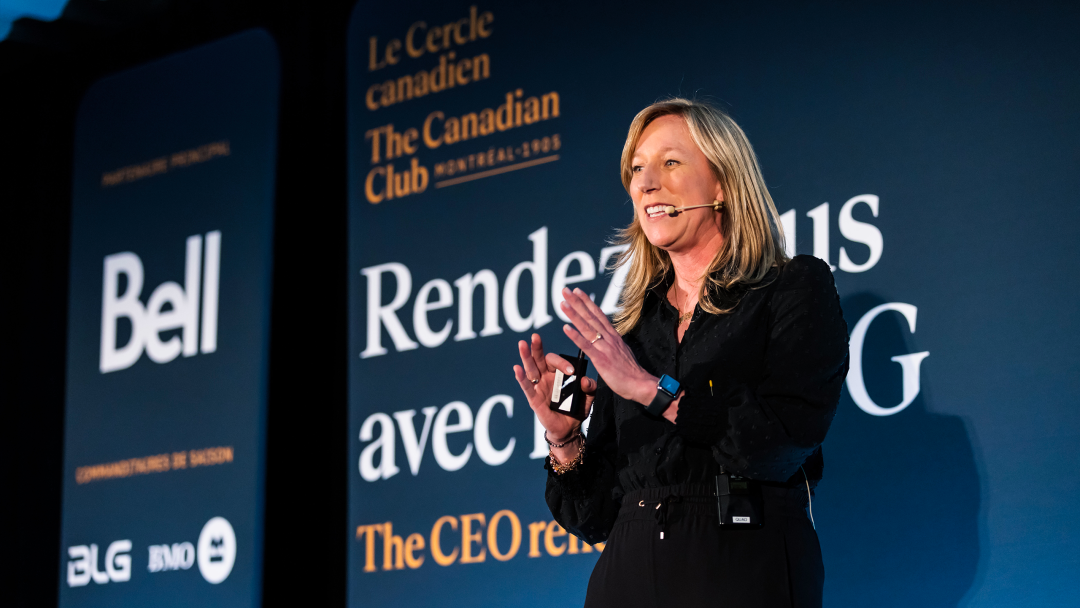To mark our 50th anniversary, Mélanie Dunn, President at Plus Company Canada and CEO at the agency, hosted a conference for members of the Canadian Club of Montreal. Using anecdotes and material from the company’s archives, she explained how Cossette shaped the ad industry in Quebec while experiencing rapid growth in Canada and abroad.
50 years of creativity and entrepreneurship
On April 17, as part of the CEO Rendez-Vous program, Mélanie hosted a bold but honest conversation with Quebec businesspeople. She showed how Cossette has been able to leave a mark on Quebec culture and in the minds of Canadians over the last 50 years.
From the agency being founded in 1972 to the share ownership agreement with the CDPQ in 2021—not to mention the creation of Quebec’s iconic health card (nicknamed the “carte soleil”) in 1976 and a pivotal partnership with McDonald’s Canada beginning in 1986—Cossette has pushed local and international brands to conquer their markets and enter new ones. It can be said with utmost confidence that our creativity is limitless and we’re playing in the big leagues everywhere in the country.
Cossette owes its success to a series of reinventions accelerated by the digital revolution, the hyperfragmentation of audiences, the modernization and personalization of brand experiences, and new regulations and ethics in the marketing industry. We built our know-how and reputation by creating daring ads and continuously adapting our integrated services to better reflect changes in society.
Today, Cossette is a combination of various areas of expertise and a diversity of talented individuals who empower brands to be as relevant, influential and high-performing as they can be.


Prospects of the industry with Stéphanie Grammond
After her presentation, Mélanie had the opportunity to talk to Stéphanie Grammond, Chief Editorialist at La Presse, about trends and innovations that influence the landscape of creative industries in Canada. Some of the topics of discussion included the meteoric rise of artificial intelligence, marketing spends during a recession, integrating ESG principles in media, and the agency’s new business reality now that it’s mainly Quebec-owned.

Working with AI
Though AI is already being integrated into the creative industry, people still have a number of questions about this technology, particularly relating to risk in terms of discrimination, data privacy, and misinformation. But despite its current limitations, it shouldn’t be seen as a threat—rather, it should be thought of as another tool to improve how people work. For example, it can be used to generate images, build chatbots, produce different ad formats, code websites, and automate repetitive tasks. This means employees can focus on what makes them unique and human, leveraging their originality, empathy, judgment, and personal experiences.
Managing marketing spends during a recession
The threat of a recession continues to loom over our economy. With rising inflation and uncertainty plaguing many industries, it’s hard for businesses to properly adjust their marketing budget. While some will want to cut back or eliminate their ad spend, the best thing to ensure profitability is to actually maintain your investments so you can preserve brand equity, plan for the longer term, adapt to the reality of your industry, and show empathy and solidarity in your content.
Promoting responsible and sustainable media and advertising practices
It’s high time that advertisers and their agencies own up to the role they play in overconsumption, social inequity, misinformation, and political intervention. First of all, it’s essential that any content be truly representative of the population and free of prejudice, which can be done by building diverse creative teams. Second, we need to support a strong and healthy media ecosystem by prioritizing ad placements in credible and trustworthy local media outlets, like those backed byMouvement média d’ici. Finally, the industry must act to counter the environmental impact of its activities by collaborating with responsible partners to more adequately measure, reduce and offset its CO2 emissions through green initiatives that are more energy efficient.
Helping Quebec know-how shine
In a shareholder structure, it’s crucial for the framework to address current and future business objectives—it must also be in line with its social and economic context. That’s exactly why our share ownership agreement with the CDPQ and CVC Capital Partners perfectly suits our needs. It encourages us to continue expanding abroad and export our creativity to new markets to encourage people to buy Quebec products, which in turn supports our economy. We’ve managed to do this for the last 50 years, and we’ll keep doing it for another 50.


About the Canadian Club of Montreal
The Canadian Club of Montreal offers luncheon presentations where business leaders share their vision, their innovation strategies and perspectives on current events and important issues. Through its open and influential forum of the highest-calibre speakers, the Canadian Club offers networking opportunities, stimulates reflection and debate, and promotes discussion.




Photos credits: ©J-F Galipeau
Taken from: https://www.cossette.com/en/newsworthy/melanie-dunn-at-the-canadian-club-of-montreal





